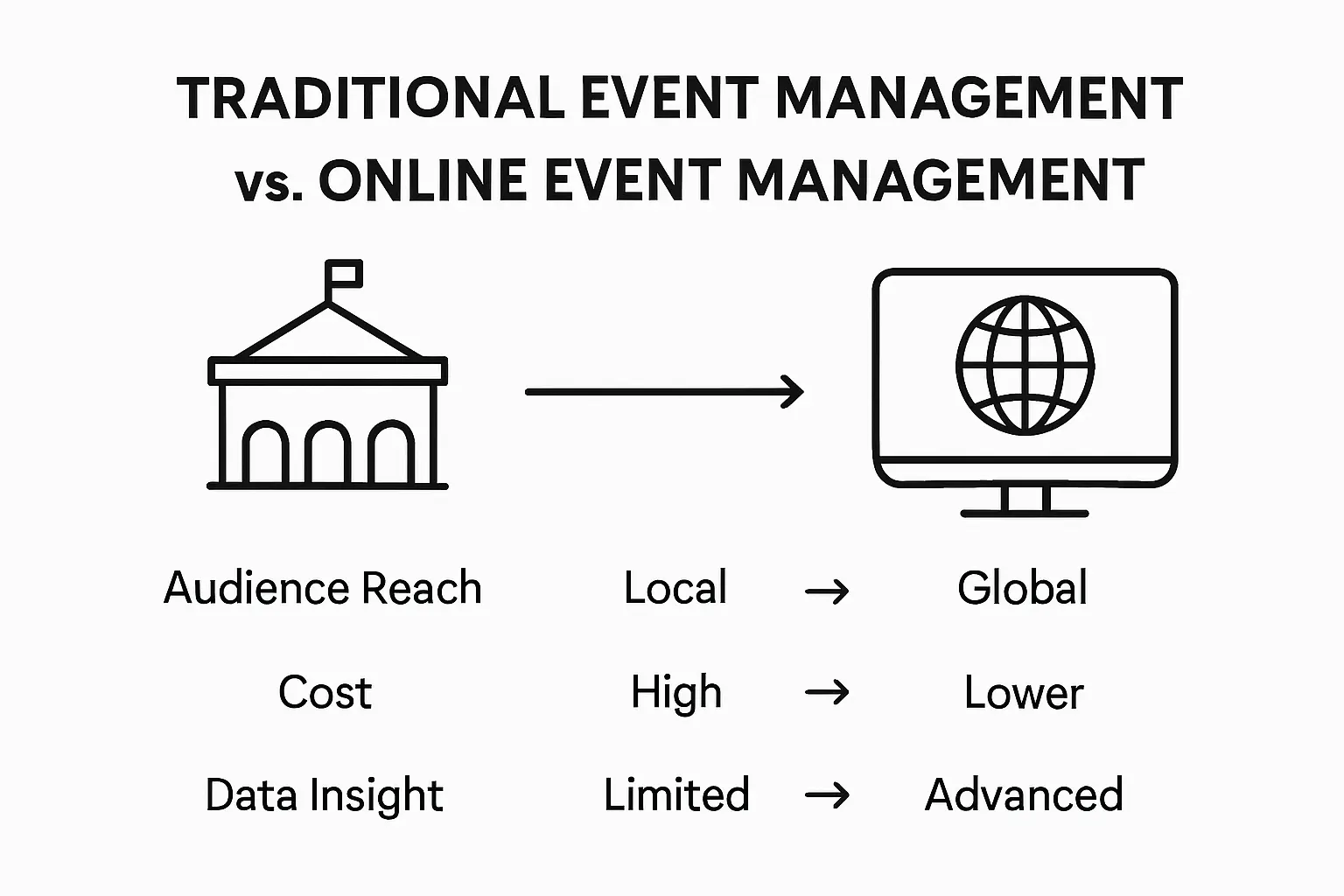Understanding Online Event Management for Organisations

Online event management is reshaping how organisations connect and interact with their communities. You might think it’s all about convenience and cutting costs, but that barely scratches the surface. The real shift comes from the ability to host global conferences, deliver instant feedback, and track engagement in real time, with some platforms now supporting worldwide events for thousands of participants simultaneously. That changes everything about what events can achieve.
Table of Contents
- Defining Online Event Management: What Does It Mean?
- The Importance Of Online Event Management For Organisations
- Key Components Of Effective Online Event Management
- How Online Event Management Facilitates Engagement And Collaboration
- Real-World Examples Of Successful Online Event Management
Quick Summary
| Takeaway | Explanation |
|---|---|
| Leverage digital platforms for events | Use virtual platforms to plan and execute engaging online events. |
| Focus on participant engagement strategies | Develop dynamic interaction models to encourage active involvement during events. |
| Utilise data analytics for improvement | Implement analytics to track engagement and refine future event strategies. |
| Ensure accessibility and global reach | Offer digital formats to remove geographical barriers and enhance participation. |
| Adopt a strategic approach to online management | Combine technology with organisational goals for more impactful communication and collaboration. |
Defining Online Event Management: What Does It Mean?
Online event management represents a comprehensive digital approach to planning, executing, and tracking organisational events through technological platforms. Unlike traditional event management, this modern strategy leverages digital tools to create seamless, interactive experiences that transcend physical limitations.
The Core Components of Online Event Management
At its fundamental level, online event management involves several interconnected technological processes. These processes enable organisations to design, promote, host, and analyse events entirely through digital channels. Our guide on event marketing strategies offers deeper insights into these advanced techniques.
Key components typically include:
- Virtual event platform selection
- Digital registration and ticketing systems
- Real-time participant engagement tools
- Comprehensive analytics and reporting mechanisms
- Integrated communication channels
Why Digital Transformation Matters in Event Management
According to Kent State University’s online Event Management research, digital event management represents more than technological convenience. It fundamentally transforms how organisations connect, communicate, and create meaningful experiences.

Modern online event management enables unprecedented flexibility. Organisations can now host global conferences, training sessions, and networking events without geographical constraints. These digital platforms provide robust tools for participant tracking, interaction monitoring, and post-event performance analysis, giving organisational leaders unprecedented insights into attendee engagement and event effectiveness.
The technological infrastructure supporting online event management allows for real-time collaboration, instant feedback collection, and comprehensive participant data tracking. This approach represents a significant leap from traditional event planning methodologies, offering organisations more strategic, data-driven approaches to creating impactful events.
The Importance of Online Event Management for Organisations
Online event management has become a critical strategic tool for organisations seeking to enhance their engagement, communication, and operational efficiency. By integrating sophisticated digital platforms, organisations can transform traditional event experiences into dynamic, interactive, and data-driven interactions.
Strategic Advantages of Digital Event Management
Modern organisations recognise that online event management offers far more than simple logistical convenience. According to research in the International Journal of Information Technology, these digital platforms provide comprehensive solutions that address multiple organisational needs. Learn more about increasing event attendance to maximise your digital event strategies.
Key strategic advantages include:
- Enhanced global reach and accessibility
- Reduced operational costs
- Precise audience targeting
- Advanced performance tracking
- Immediate scalability
Transforming Organisational Communication and Engagement
Online event management fundamentally reimagines how organisations communicate and interact with their stakeholders. Digital platforms enable real-time collaboration, breaking down geographical barriers and creating opportunities for more inclusive, interactive experiences. Whether hosting international conferences, member training sessions, or networking events, organisations can now design experiences that are not constrained by physical limitations.
Moreover, these digital platforms provide unprecedented data insights. By capturing detailed participant interactions, engagement metrics, and feedback, organisations can continuously refine their event strategies. This data-driven approach allows for more personalised, targeted experiences that directly respond to audience preferences and organisational objectives.
The evolution of online event management represents more than a technological shift—it is a strategic transformation that empowers organisations to communicate more effectively, engage more deeply, and operate with greater agility in an increasingly digital world.
The following table outlines and compares the key strategic advantages of traditional vs. online event management, as referenced throughout the article.
| Strategic Advantage | Traditional Event Management | Online Event Management |
|---|---|---|
| Global Reach | Geographically limited | Worldwide participation possible |
| Operational Costs | Often high (travel, venues) | Reduced (digital tools, less travel) |
| Audience Targeting | Broad & less precise | Precise, data-driven targeting |
| Performance Tracking | Limited, manual feedback | Real-time analytics & insights |
| Scalability | Constrained by logistics | Immediate scalability |
| Accessibility | May have barriers | Enhanced, inclusive, flexible |
Key Components of Effective Online Event Management
Effective online event management requires a sophisticated integration of technological infrastructure, strategic planning, and user-centric design. Organisations must develop comprehensive digital ecosystems that seamlessly connect multiple operational elements to create engaging, impactful virtual experiences.
Technological Infrastructure and Platform Selection
The foundation of successful online event management lies in selecting robust digital platforms that support complex organisational needs. According to research examining online coordination methods, organisations must prioritise platforms offering comprehensive communication and collaboration capabilities. Explore our guide on event registration strategies to understand how technological choices impact event success.
Critical technological considerations include:
- Scalable cloud infrastructure
- Multi-device compatibility
- Advanced security protocols
- Integrated communication tools
- Real-time data analytics capabilities
Strategic Planning and Participant Engagement
Successful online event management transcends mere technological implementation. It requires nuanced strategies that anticipate participant needs, create interactive environments, and deliver meaningful experiences. Organisations must design digital events that not only transmit information but also foster genuine connections and collaborative opportunities.
Key engagement strategies involve developing dynamic participation models that encourage active involvement. This might include interactive workshops, live polling, breakout discussion rooms, and personalised networking opportunities. By creating multi-dimensional digital spaces, organisations can replicate and sometimes even enhance the richness of in-person interactions.
Moreover, comprehensive online event management demands continuous adaptation. Organisations must remain agile, using real-time feedback and performance metrics to refine their approach. The most effective digital event platforms provide instantaneous insights into participant behaviour, engagement levels, and overall event performance, enabling organisations to make data-driven improvements in real time.
This table presents an overview of the core technological components required for effective online event management, summarising the features detailed in the article.
| Component | Description |
|---|---|
| Virtual Event Platform | Digital space for hosting, streaming, and managing events |
| Registration & Ticketing System | Online process for participant sign-up and access control |
| Engagement Tools | Mechanisms for live chat, polling, Q&A, and breakout rooms |
| Analytics & Reporting | Real-time data collection, tracking, and performance analysis |
| Integrated Communication Channels | Unified messaging, notifications, and collaboration features |
| Multi-device Compatibility | Accessibility across desktops, tablets, and mobiles |
| Security Protocols | Data protection and privacy safeguarding measures |
How Online Event Management Facilitates Engagement and Collaboration
Online event management has revolutionised how organisations create meaningful interactions, transforming digital spaces into dynamic platforms for collaboration, learning, and community building. By leveraging sophisticated technological tools, organisations can now design immersive experiences that transcend traditional communication barriers.

Interactive Digital Environments
Interactive digital environments are the cornerstone of effective online event engagement. According to Stanford University’s guide on digital events, organisations must strategically integrate multiple engagement tools to create compelling virtual experiences. Explore our insights on online community management to understand deeper collaboration strategies.
Key interactive features include:
- Live chat functionality
- Real-time polling mechanisms
- Breakout discussion rooms
- Q&A session platforms
- Collaborative whiteboard tools
Designing Collaborative Digital Experiences
Successful online event management goes beyond mere information transmission. It requires creating purposeful digital spaces that encourage active participation, knowledge sharing, and genuine human connection. Modern organisations understand that collaboration is not about technology, but about creating meaningful opportunities for interaction.
This approach involves designing multilayered engagement strategies that cater to diverse participant preferences. Some participants might prefer structured panel discussions, while others thrive in more informal networking environments. By offering varied interaction modes, organisations can create inclusive digital experiences that accommodate different communication styles and learning preferences.
Moreover, advanced online event platforms provide sophisticated analytics that help organisations continuously refine their collaborative strategies. By tracking participant engagement, interaction patterns, and feedback in real time, organisations can adapt their approaches, ensuring that each subsequent event becomes more interactive, responsive, and aligned with participant expectations.
Real-World Examples of Successful Online Event Management
Online event management has transformed from a niche technological solution to a critical organisational strategy, enabling institutions across various sectors to maintain engagement, deliver knowledge, and build communities in increasingly digital environments. These real-world examples demonstrate the profound impact of sophisticated digital event platforms.
Academic and Educational Adaptations
Educational institutions have been at the forefront of embracing online event management technologies. According to Georgetown University’s case study on web conferencing, universities have successfully transitioned complex learning experiences into digital spaces. Learn more about sustainable event planning to understand comprehensive digital transformation strategies.
Notable educational online event management strategies include:
- Hybrid conference models
- Interactive virtual lecture series
- Global student exchange programmes
- Collaborative research symposiums
- Professional development webinars
Nonprofit and Professional Association Transformations
Successful online event management goes beyond technological implementation. It represents a strategic approach to maintaining organisational connections and delivering value to members. Professional associations and nonprofits have demonstrated remarkable adaptability in creating engaging digital experiences that replicate and sometimes enhance traditional in-person interactions.
Organisations have discovered that well-designed online events can actually increase accessibility and participation. By removing geographical barriers and offering flexible attendance options, these digital platforms enable broader reach and more inclusive engagement. Sophisticated event management tools allow for nuanced participant tracking, personalised content delivery, and real-time interaction metrics.
Moreover, these digital transformations have enabled organisations to develop more sustainable, cost-effective event strategies. By reducing travel requirements, minimising physical infrastructure needs, and creating reusable digital content, online event management represents not just a temporary solution, but a long-term strategic approach to organisational communication and community building.
Ready to Transform Your Online Event Management?
Are you struggling to keep your organisation’s events engaging and interactive in a digital landscape? As outlined in our guide to online event management, organisations today face enormous pressure to deliver seamless digital experiences that not only connect members but also generate measurable growth. From managing complex registration processes to capturing valuable engagement data, the need for a unified solution has never been more urgent. If you want to attract more members, improve retention and deliver compelling digital events, you can benefit from a platform that addresses performance tracking, participant engagement and integrated communications all in one place.

Imagine a world where your event planning, member management and marketing all work together—effortlessly. Colossus Systems offers everything you need to streamline events and build vibrant membership communities online. Cut through the complexity and discover how our powerful SaaS solution can help you take control of your growth. Whether you want to learn more about event marketing strategies or improve your event registration strategies, Colossus Systems is ready to help. Reach out today at Contact Colossus Systems and see real results with your next online event. Act now to ensure your organisation stays ahead.
Frequently Asked Questions
What is online event management?
Online event management is a digital approach to planning, executing, and tracking events using technological platforms, allowing organisations to create interactive experiences without geographical constraints.
What are the key components of effective online event management?
Key components include virtual event platform selection, digital registration and ticketing systems, participant engagement tools, analytics and reporting mechanisms, and integrated communication channels.
How does online event management enhance participant engagement?
Online event management enhances engagement by facilitating real-time collaboration and providing interactive features such as live chat, polling, breakout rooms, and collaborative tools, allowing for more dynamic and personalised participant experiences.
What are the strategic advantages of using online event management for organisations?
Strategic advantages include enhanced global reach, reduced operational costs, precise audience targeting, real-time performance tracking, and immediate scalability, leading to more effective and impactful events.
Recommended
- Event Marketing Strategies for Membership Groups and Associations|CS
- How to Increase Event Attendance: Proven Strategies that Work|CS
- Effective Event Registration Strategies for 2025 Success|CS
- Event and learning management systems to help engage members|CS
- Event Signage Checklist 2025: Essential Guide for London Businesses - PromoSigns.co.uk